Indignation and ignominy may be two separate words but sometimes they become mutually inclusive. It generally happens when an issue is raised due to the lack of information in public domain. Nothing can be compromised when security of nation is prime but the ancillary things shall surely be discussed. Biggest issues raised in Rafale deals are: 1) The hike in price of a Rafale from 570 crore to 1,670 crore, which is surely 2.5 times the deal under UPA regime. 2) The role of Anil Ambani Conglomerate in the deal. People are ambiguous about his role and the credibility of offset partner chosen by Dassault (manufacturers of Rafale) over HAL. Relentlessly these questions are being raised and the crony capitalism maneuvered by the NDA regime has also been alleged. Issue No. 1: On the papers it may seem that a big blunder has been created by the Government while purchasing so expensive jets but defense ministry’s internal calculations show that India has procured each Rafale jet 59 crore cheaper than it would have cost under UPA deal. Moreover the Jets bargained by NDA Government are equipped with ability to take off from high altitude stations. These are one time research and development costs. The Government has cleared that the Jets are not only cheaper but also surmounted with lethal weapons and more efficient with a performance guarantee clause. So, both the deals are incomparable. One prime example is the Meteor missiles. And the best part is that all the jets shall be in fly away conditions. It is all about buying the high end Mercedes equipped with high class accessories along with the free maintenance. And we the Indians surely know about the difference in buying the lower model and high end model. Also buying one and maintaining one. Coming to the issue no. (2): The role of Anil Ambani led Aerospace is very much related to the offset obligation of original contract. The clause mandated that French companies shall invest at least 50% of the contract value in projects or work given to Indian entities. Offsets play a crucial role in transferring of technology and make the nation self reliant. Inculcating and Infusing the best research and development is the goal. The offset clause is the concomitant of defence deals since UPA regime but it is challenging to make it an obligation for the off shore partners. This is the sublime ability of diplomacy to make such things work. The offset clause shall deliver its liability in only three years after signing the contract. The French companies shall deliver on offsets from October 2019. When the permissions are to be given by the Government for the Indian partners, then surely the doubt about Dassault Reliance Aviation Ltd. (DRAL) do creep in. On this issue Government has categorically stated that the talks during UPA regime failed due to the fact that Dassault and HAL could not strike the deal. Hence to break this impasse and securing the skies the only way was to start afresh.
The stand of Government is that it was Dassault prerogative to chose its offshore partner and nothing has been conceded by the Government. Government may hail it as the best deal but some questions are still there which have to be confronted : 1) Indian Airforce has depleted strength and they surely require the armory along with flying components. When deal is for 36 top notch jets then why not the ante was upped and more jets were procured? In this avenue it may be that security of nation is compromised. 2) Not that HAL is the only aerospace company in India. There are many other establishments like Boeing then why only Ambani’s Aerospace got the major chunk in offshore liabilities of Dassault. We do adhere to the fact that in defence deal all things should not be in public domain but this ancillary thing should be made clear. Every component of this information should be shared in democracy. If not then accusations of crony capitalism should be bore. It is the perfect and curious case of information not being dispersed properly in public domain. The outrage will surely be there, furore will surely be there. It is the responsibility of the Government to make it lucid. Dr. Ashish Tanwar, Campus Law Centre, University of Delhi 29 August 2018
